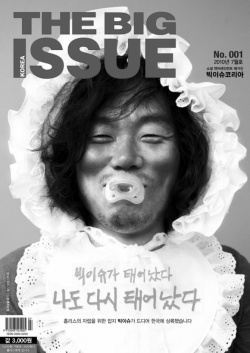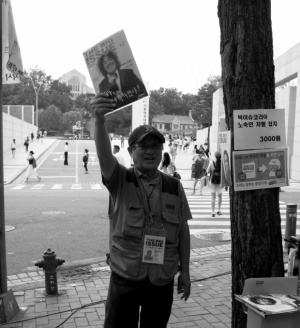
Oh. They have one other main difference with street salesmen: They are homeless.
There is an old adage that if you teach a man how to fish that he can feed himself rather than being dependent on others. That adage is being updated today by a pair of British social entrepreneurs who are teaching homeless people how to support themselves through entrepreneurship.
Rather than complaining about or looking down on the homeless, Gordon Roddick, the co-founder of the Body Shop and John Bird, started The Big Issue, a monthly social entertainment magazine in 1991 to help homeless become independent.
Now the magazine has expanded across the globe from Australia to Japan to South Korea. It has now landed at the Main Gate of Ewha.
Sold at 14 selected locations around Seoul, Ewha students may be surprised to learn that their university is one of the main markets of The Big Issue Korea.
“Based on the statistics from The Big Issue Japan and Australia, target readers are women in their 20s and 30s,” said Kim Young-whan from the Sales Division of The Big Issue Korea. “Ewha’s large younger female population is perfect.”
The vendors agree, based on their own experience. “I’m selling twice as many copies at Ewha than where I used to sell,” said Hong Sam-yong, a vendor located at the Main Gate, smiling. “I used to sell around 15 copies a day at Gangbyeon Station but I sell over 50 copies at Ewha.”
The Big Issue Korea recruits volunteers to assist the vendors with sales.
“The vendors are more positive and determined than I expected,” said Kim Yea-chan, a volunteer. “They are confidently preparing to support themselves.”
In order for the vendors to successfully sell with proper work ethics, the Big Issue Korea has established the Code of Conduct for Vendors, modeled on success stories in Australia and Japan. It asks the vendors basic yet important rules in street selling from no drinking or smoking to selling only in the designated areas.
The vendors are recruited from homeless support centers or soup kitchens. Hong was found by The Big Issue Korea at the Korea Support Center for the Homeless last June and once again at a church where he was getting a free lunch.
“I should have started working earlier but I had no opportunities,” said Hong. “Now I am earning a living.”
After getting trained, the vendors work for 15 days as temporary vendors before becoming staff vendors. They can buy the magazine for 1,400 won each from The Big Issue Korea and sell it on the street for 3,000 won.
Vendors are required to deposit at least 50 percent of the 1,600 won revenue in their personal bank accounts so they can save money and stand on their own feet one day.
The Big Issue rehabilitates homeless vendors by signing rental houses for the vendors who saved more than 6,000,000 won in their personal accounts and provides vocational training after they have collected enough money to support themselves.
Sales of the Big Issue Korea are completely legitimate. Seoul city and the Seoul Metropolitan Rapid Transit Corp excuse homeless vendors in the official red Big Issue uniform selling the magazine.
“The Big Issue vendors may look like regular illegal street salesmen on the street,” said Kim Young-whan from The Big Issue Korea. “But we do not set up stalls. We sell only with minimum space and tool.”
It may feel good to help the homeless, but still, some may wonder: Is the magazine good? And what do they write about?

The Big Issue Korea highlights a new lifestyle for younger city residents with articles on various topics from trendy culture to self-development.
The Big Issue Korea hires freelance reporters to write articles. It is also part of the International Network of Street Paper allowing it to share and use articles with other group members. Readers praise it as being high-quality.
“I bought the magazine as a mere donation to homeless people,” said Jin Bo-kyung (Chung-ang University, 2). “But the quality of the magazine is better than what I expected.”

